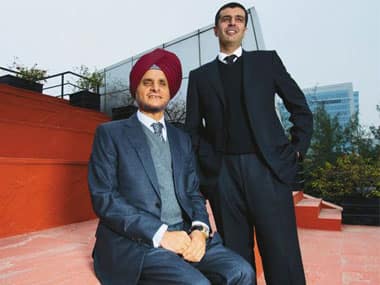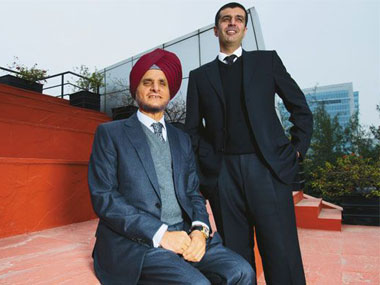New York: With the Indian economy growing at its slowest pace in a decade, Indian companies in search of growth are considering stepped-up investment in the US. A sharply weaker rupee, which touched a record low of Rs 60.61 per dollar on Monday, is also forcing Indian companies to try and boost dollar earnings.
We are seeing a burst of overseas takeover bids from Indian companies hungry to expand. Last month, India’s Apollo Tyres agreed to pay $2.5 billion for Cooper Tire & Rubber Co., one of the largest US acquisitions by an Indian company.
[caption id=“attachment_940961” align=“alignleft” width=“380”]
 Onkar and Neeraj Kanwar of Apollo Tyres have agreed to pay $2.5 billion for Cooper Tire & Rubber Co., one of the largest US acquisitions by an Indian company. The deal catapults Apollo into the number 7 position on the list of top 10 global tyre makers. Picture: Forbes India.[/caption]
Onkar and Neeraj Kanwar of Apollo Tyres have agreed to pay $2.5 billion for Cooper Tire & Rubber Co., one of the largest US acquisitions by an Indian company. The deal catapults Apollo into the number 7 position on the list of top 10 global tyre makers. Picture: Forbes India.[/caption]
“This creates a solid, global company,” said Apollo Vice Chairman Neeraj Kanwar. He explained he wants to leverage Cooper’s independent dealer network to sell Apollo tires in the US. Apollo which gets two-thirds of its revenue from the Indian market expects the acquisition will boost its exposure to the US market.
Last week, India’s largest motorcycle and scooter maker by sales, Hero MotoCorp bought a 49.2 percent stake in Wisconsin-based Erik Buell Racing LLC, a maker of high-end street motorcycles, for $25 million. The stake purchase in Erik Buell follows a tech alliance with Hero MotoCorp last year.
Impact Shorts
More ShortsPawan Munjal, chief executive of Hero MotoCorp said the partnership with Erik Buell would allow Hero MotoCorp not only to develop new products, but also to sell its motorcycles in the US and Europe. Hero MotoCorp is aiming to export 350,000 vehicles this financial year through March 2014, compared with 161,043 vehicles exported in the previous year.
Indian companies are bidding for at least $10 billion worth of global deals and, if successful, the outbound M&A volumes this year would rise to $13 billion, the highest since a record year in 2010, shows Thomson Reuters data.
Apart from acquisitions, India has also stepped up direct investments which generally translate into US jobs. In October last year, the US Deputy Secretary of State William Burns said that from 2000-2010 Indian direct investment in America grew from $200 million to $5 billion. Burns pointed out Indian firms helped create 50,000 jobs in the US.
The US-India Business Council (USIBC) is all set to release a study on Thursday that makes an upward revision.
“Investment by Indian companies in the US has touched a record $11 billion and in the process has created more than 100,000 jobs,” says the USIBC study.
The report titled “Investing in America, how India helps create American Jobs” will burnish India Inc’s image at a time when the US immigration bill with its bureaucratic H-1B visa provisions is being debated in the House. The proposed reforms could force Indian IT companies to hire thousands of new American employees or make acquisitions to ramp up American staff.
“Over the short term, the legislation would likely have a negative impact on Indian-heritage IT companies and give a competitive edge to US firms,” said Sid Pai, Partner and President, ISG Asia Pacific.
“Over the long term, however, the provisions could encourage Indian firms to expand their US presence. Specifically, to avoid the provisions of the bill, Indian companies may step up local hiring and focus on acquisitions of US-based companies,” added Pai.
Indian tech firms certainly have the money to make US acquisitions. Analysts don’t tire pointing out that Infosys has $7 billion in revenue and a $4 billion war chest for major acquisitions. But for now Infosys, Tata Consultancy Services, HCL Technologies, Wipro and NIIT Technologies are stepping up hiring in the US.
NIIT says it has scooped up nine new customers and has been hiring to service US-centric projects. It has 7,730 people spread out in development centers in India, Atlanta and Augusta. In September last year, it acquired US firm Sabre Holdings’ Philippines Development Center for an undisclosed sum.
“We have been hiring in the US to build on high-end capability. We need software engineers to look at very complex algorithms. We find the right people here,” Lalit Dhingra, president, NIIT Technologies, told Firstpost.
Tata Consultancy has built 50 offices in the US to be near its biggest customers. It plans to hire 2,000 US employees in the current fiscal year that began in April, some 400 more than last year. In 2008, TCS opened its biggest, $20-million software development center, tucked away on 220 wooded acres in Milford, a suburb of Cincinnati, in Ohio. It has followed it up with a new TCS Solutions Center in Minneapolis in Bloomington, Minnesota.
“These facilities represent TCS’ latest investment in the US market as we seek out ways to better serve our customers here,” said Surya Kant, President of TCS’ North American, UK and European operations.
Finance Minister Palaniappan Chidambaram is scheduled to travel to the US on Monday and the prospects for fresh Indian investment will be discussed between him and US leaders. Chidambaram will meet US Treasury Secretary Jacob Lew and US business leaders such as Walmart Asia CEO Scott Price and Boeing International president Sheperd W Hill.
“For India to invest in the US, to create jobs and manufacture products here, could be quite a constructive contribution to our growth and to better relations between our two countries,” a senior White House official said.
In the US, advanced drilling technology has sparked an oil and natural gas revolution. But it’s not just US energy companies that are investing in the boom. Foreign firms are keen to get a piece of the action. According to Energy Information Administration data, Chinese firms have invested $5.5 billion in US shale oil and gas projects through joint-ventures while Japanese firms plowed $5.3 billion, and Indian companies spent $3.55 billion. Korean firms have invested $1.55 billion.
)